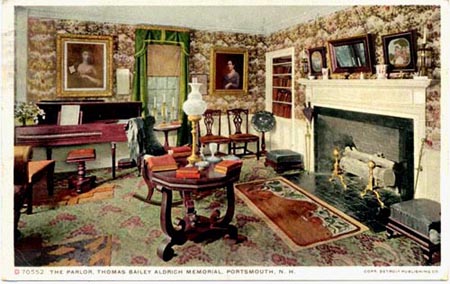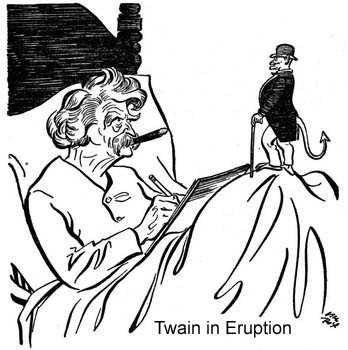|
FRESH STUFF DAILY |
|
|
||
|
|
||
|
|
||
|
SEE ALL SIGNED BOOKS by J. Dennis Robinson click here |
||
Twain loved his friend TB Aldrich. Aldrich, Twain said, was brilliant, sarcastic, ironical and merciless in private, but sophisticated and genteel on the outside. But Twain hated Aldrcih’s wife Lillian and called her a "strange and vanity-devoured, detestable woman!" In 1908 the elderly cranky Twain came to Portsmout, NH to dedicate a museum, designed by Lillian, to honor her husband. Here’s how it went.
More on Bad Boy Aldrich
"How could you have brought a man like that to your home?" she screamed at her husband. "Why dear, did you not know who he was?" responded Aldrich. When he told her there was a sudden silence. According to her own account, Mrs. Thomas Bailey Aldrich began screaming the name repeatedly like a riverboat pilot measuring the depth of the Mississippi. She had thrown out the most famous man in America. "Mark Twain!" she sobbed hysterically. "Mark Twain!" As members of the Boston and New York literati, the Aldriches had entertained them all -- from Harriet Beecher Stowe (whom Lillian also could not stand), to favorites like actor Edwin Booth, author Bret Harte, painter James McNeil Whistler, even poet Henry Wadsworth Longfellow. Despite being kicked out of the Aldrich house, Samuel Longhorn Clemens, aka Mark Twain and Aldrich became fast friends. Twain described his friend as endlessly witty. "When he speaks," Twain once remarked of Aldrich, "the diamonds flash... He was always brilliant, he will always be brilliant, he will be brilliant in hell -- you will see."
A thousand people turned out on a hot day for the star-studded event, thick with eulogies from writers and politicians whose names are unfamiliar today. Then Mayor Hackett introduced the one man in town who needed no introduction. At 73, still sharp and sarcastic, Twain had been toasted by kings and presidents. He was internationally known for his shock-white mane of hair, his white hat and crisp white suit. But today, hot as it was, Mark Twain was dressed in a dark coat and hat. He had been told by his family, he said, to wear black and act respectful for a change while dedicating the Aldrich Memorial. CONTINUE with TWAIN IN NEW HAMPSHIRE "They seemed to think this was a funeral I was coming to, when in point of fact it is a resurrection and an occasion of joy," Twain told those gathered. "Aldrich's life was cheerful and happy. I knew him 40 years. He was one of the brightest men it has ever been my pleasure to know."
"He looked pained," Twain said borrowing a joke from Aldrich's own writing, "He looked as if somebody had died -- and it wasn't the right person." When the two great authors met, Aldrich told Twain he was sad for him, since Twain had once been the most popular writer in the country. Now sadly, Aldrich told Twain, his popularity was all gone. Surprised by the remark, Twain asked how that was possible, so Aldrich led him to a local bookstore. Aldrich asked the bookseller if he had any books by Thomas Bailey Aldrich, and the bookseller replied "no." Then Aldrich asked if he had any volumes by a Mr. Mark Twain. The bookseller said the store was full of them. "You see," Aldrich said, turning sadly to Mark Twain, "your popularity is all gone. I'm popular now. He's sold out ALL of my books!" Twain loved sharp wit, his own in particular, but Aldrich's too, especially when it was used to slash at pompous conventions, Victorian rigidity or political deceit. One of the sharpest public tongues in America, Twain bowed to Aldrich's hidden dark side. Twain later wrote: "When it came to making fun of a folly, a silliness, a windy pretense, a wild absurdity, Aldrich the brilliant, Aldrich the sarcastic, Aldrich the ironical, Aldrich the merciless, was a master." Thomas Bailey Aldrich, above all, he wrote later, would have hated the pretensions of his own memorial ceremony. Twain certainly did, sweating in the stifling opera house in his black suit waiting for the "riff-raff" ahead of him to drone on. Later he toured the Aldrich Memorial, a shrine to a not-very-famous writer that Twain thought would appeal to one in ten thousand Portsmouth visitors. It was a shrine, more correctly, Twain thought, to Aldirch's impossible wife Lillian. Twain watched her smiling joyfully in their carriage. Lillian Was in her element, squeezed between the top-hatted state Governor Curtis Guild and NH Adjutant General Cilley, a man aptly named – Twain thought -- and festooned in ridiculous epaulets, ropes and clusters. We know exactly what Twain was thinking that day in Portsmouth because he wrote his impressions down. Twain left his scathing notes after his death, but insisted that his private scribblings be suppressed for another 75 years to protect his victims from his acid tongue. Twain's eager biographers, however, could not wait that long. The first of what would be many volumes of Twain biographies appeared in 1922, just a dozen years after his death. The book was called "Mark Twain in Eruption," and it must have seemed that to Lillian Aldrich, whose own chatty book about her husband's literary circle, "Crowding Memories", had arrived on the shelves in 1920. In his private writing Twain described Mrs. Aldrich as: "A strange and vanity-devoured, detestable woman! I do not believe I could ever learn to like her except on a raft at sea with no other provisions in sight." Mr. Clemens, it seems, had also not forgotten their first encounter. According to Lillian Aldich's memoirs, the Aldrich's and Twains had a number of joyous encounters -- in Boston, in New York and while travelling in Europe. The more Twain's fame grew, the more she seemed to appreciate him, although not his "moody" wife. Twain recalled things differently. "I conceived an aversion for her the first time I ever saw her," Twain wrote in his secret journal, "which was thirty-nine years ago, and that aversion has remained with me ever since. She is one of those people who are effusively affectionate, and whose demonstrations disorder your stomach. You never believe in them; you always regard them as fictions, artificialities, with a selfish motive back of them. Aldrich was delightful company, but we never saw a great deal of him because we couldn't have him by himself." CONTINUE with TWAIN IN NEW HAMPSHIRE Twain didn't harbor much more love for his first vision of Portsmouth either. He hated the train ride on the smoke-belching Boston and Maine railroad where passengers were offered water from a battered tin cup in a bucket. The railroad cars, he suspected, were left over from the Civil War era. Instead of the venerable "Old Town by the Sea" that Aldrich had written of so lovingly, Twain saw a run-down sweltering whistle-stop on his own personal tour of the world. "A memorial museum of George Washington relics could not excite any considerable interest if it were located in that decayed town and the devotee had to get to it over the Boston and Maine," Twain grumbled into his diary after his 1908 visit.
Apologists may dismiss Twain's nasty remarks to crankiness and an often unhappy old age, but his slashing wit always revealed a bone of truth. In 1908, just two years before his own demise, Twain was certainly sour, still suffering from the loss of his wife and a daughter. He had squandered a literary fortune on a failed business investment and preferred to spend his time in bed, reading and writing. Twain's surviving daughter Clara Clemens drolly told a New York Times reporter that her celebrated father dressed all in white because it reminded him of being in bed and that his hair was white because it had changed to match the color of his pillow. Twain had little good to say about Aldrich the writer. "Aldrich was never widely know," Twain wrote, his books never attained to a wide circulation; his prose was diffuse, self-conscious, and barren of distinction in the matter of style. Aldrich’s reputation, Twain said, was based a half dozen small poems "which are not surpassed in our language for exquisite grace and beauty and finish." It was Twain’s enduring admiration for Aldrich the man that required him to leave his comfortable Connecticut bed and make the final pilgrimage, enduring outdated trains, heat and his nemesis Lillian. On second thought, Twain decided, Aldrich might actually have enjoyed this stiff, pandering memorial ceremony as a target of his own satire. He wrote in his journal: "Nobody could lash it and blight it and blister it and scarify it as he could." No, Twain noted, changing his mind again, Aldrich could never have made fun of his own memorial ceremony because Aldrich had been, above all, in love with himself. Aldrich believed that the sun rose to shine on his poetry, Twain said, and it was reluctant to set in the evening for fear of losing sight of his brilliant pages. Aldrich was one of the most vain men he had ever known, Twain concluded in his explosive journal. In fact, he concluded, that by because, above all, Aldrich was vain. He liked anything about himself. He might almost have thought, Twain wrote, that the sun rose for the sole purpose of shedding light on his writing, a belief his wife Lillian seemed to share. Bundled together, man and wife, Twain concluded, Mr. And Mrs. Thomas Bailey Aldrich came perilously close to being as vain as Mark Twain himself. To say any more on that topic, Twain concluded, might be considered "extravagant".
Please visit these SeacoastNH.com ad partners.
News about Portsmouth from Fosters.com |
| Tuesday, April 23, 2024 |


|
Copyright ® 1996-2020 SeacoastNH.com. All rights reserved. Privacy Statement
Site maintained by ad-cetera graphics

 Link Free or Die
Link Free or Die



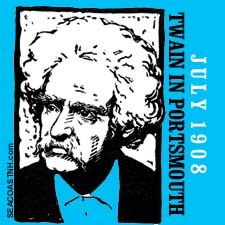 BAD BOY BAILEY
BAD BOY BAILEY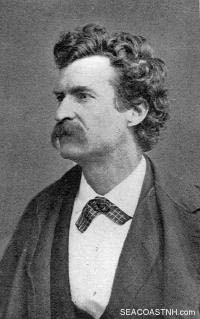 The tawny-haired young man in the sealskin coat and cap was stinking drunk. He stumbled and slurred and Lillian Aldrich wasn't about to have some scruffy rum-dum off the Boston streets stay for dinner. Her husband was the respected author Thomas Bailey Aldrich, and even if he was inclined to be hospitable to common gutter trash, she was not. So she booted the boozer out.
The tawny-haired young man in the sealskin coat and cap was stinking drunk. He stumbled and slurred and Lillian Aldrich wasn't about to have some scruffy rum-dum off the Boston streets stay for dinner. Her husband was the respected author Thomas Bailey Aldrich, and even if he was inclined to be hospitable to common gutter trash, she was not. So she booted the boozer out.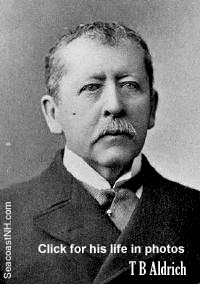
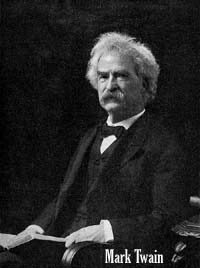 In an anecdote that is pure Twain, he told his version of their first meeting.
In an anecdote that is pure Twain, he told his version of their first meeting.